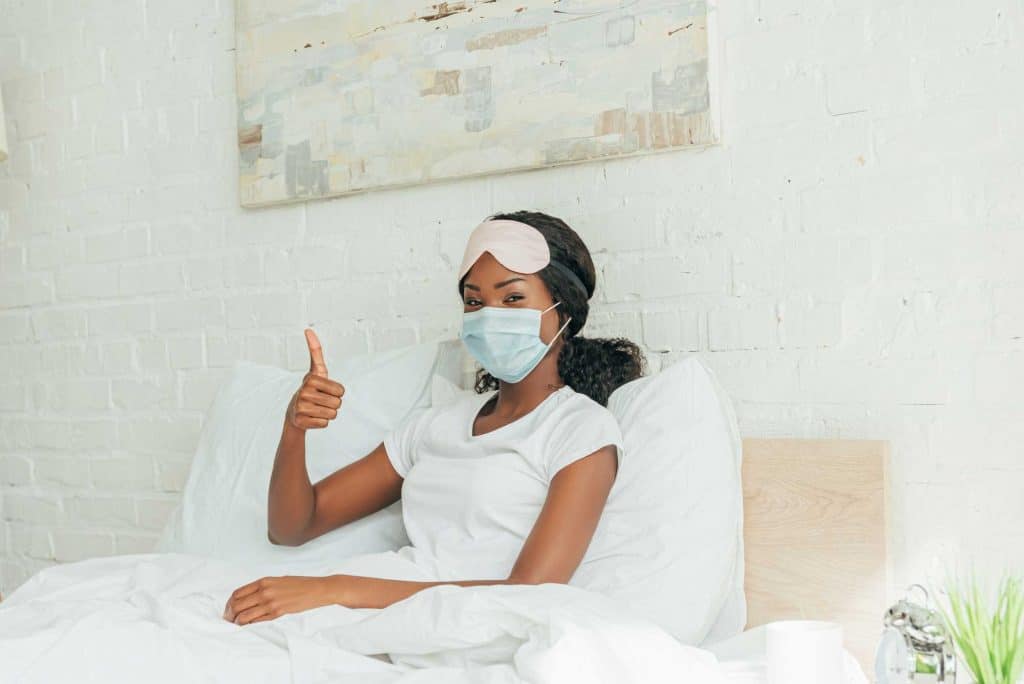
Why sleep is important during COVID-19? The global health crisis has overcrowded our hospitals, depleted our resources, and put our government to the test. The lockdown has sent our economy whirling down with all the border restrictions coming about.
All these factors can make us stressed, anxious, and depressed. For parents who are working from home, there’s the juggle of caring for the kids and work. Children will also feel overwhelmed when taking online classes.
This stress, fear, and anxiety can cause restlessness and difficulty in sleeping. However, when we don’t get enough sleep, our bodies can’t recover in its optimal state and may not be able to function normally during the day.
Also, better sleep can boost our immune system to fight against viral infections. Here’s what you need to know how sleep affects our immune system.
Relationship of sleep to the immune system
The lack of sleep can affect your immune system and you’re more likely to catch common colds or flu viruses. Various studies from Germany found that sleep, not only repairs the tired body, but it can improve immune cells called T-lymphocytes, or T-cells for short, and the production of B-lymphocytes for antibodies.
To understand the process, we’ll break the terminologies down.
Pathogens. These are invading microbes such as germs, bacteria, and viruses.
Antigen. these are proteins found in the surface of pathogens and often serve as identification to the pathogen.
Antibodies. When the antigen enters, the body sends a signal to prevent the antigen from further attacks. The immune system releases an appropriate and unique antibody that binds itself to the pathogen and destroys it.
B-cells secrete antibodies, while T-cells fight against pathogens such as virus, flu, HIV, and malign cancer cells. T-cells produce integrins and cytokines to ward off harmful pathogens.
In short, when you don’t get enough sleep, your body produces less virus-fighting cells to keep you healthy. Also, certain proteins and cells need to be fortified when you’re already battling an infection or pre-existing medical condition.
In the long run, the lack of sleep also increases your risk of hypertension, obesity, diabetes, and heart diseases, which can be aggravated by COVID-19. If you’re not getting any ample sleep, your immune system will be suppressed.

SARS-CoV-2 is a new pathogen
SARS-CoV-2, the virus behind COVID-19, is a new pathogen, which means, there are no antibodies to combat the virus directly. While the world is waiting for a cure, there are ways to build up your immune system naturally.
Take note that there is no known cure for COVID-19. These natural immune boosters, however, will strengthen your system to prevent the aggregation brought by the virus. It can banish common colds, beat obesity, and battle flu that can suppress the immune system.
And sleep is one natural booster.
COVID-19 affects the sleep habits of many Aussies
On the first week of September, Australia had a total case of 26,374, with recoveries at 22,719, and deaths at 770. According to the Sydney Morning Herald, about 46 percent of the 2,000 respondents are sleeping poorly during the pandemic, and 41 percent are waking up at night for three or more times a week.
The top causes for insomnia are:
- COVID-19 stress
- Job changes
- Financial problems
Some lifestyle-based factors aggravate sleep loss such as alcohol consumption (39 percent) and increased phone usage.
What’s interesting in the study is that 42 percent of people, who slept badly before, improved their restfulness because they sleep in a routine best suited for their needs.
For instance, people who get up early to commute find their sleeping patterns better when they work from home. Researchers also found out that these respondents get to eat breakfast at a time ideal for their body growth and development.
Nonetheless, sleep experts found a surge of first-time patients seeking help with their sleep problems. Employees who have been laid off from work found themselves anxious and suffering from shortness of breath as a response to stress.

How to improve sleep during COVID-19?
With so many things happening in the world right now, people are struggling to sleep at night. There’s a lot to worry about such as, looking for employment, your family’s health and safety, necessities, bills, and more.
When you’re desperate for some sleep, it’s tempting to rely on sleep aids. Why not try some healthy ways to get the rest you need?
If you’re stressed due to the pandemic, it can have detrimental effects on sleep. So, how do you deal with the difficulty of anxiety at bed?
Identify triggers and seek support
Do you know what triggered your heavy feelings? If you know the source of your problems, you can handle it better in a productive way. Do you know who to call for help? Can you delegate someone else to do it for you? Should you prioritize this or that? By identifying triggers, you get control over how to tackle it.
Seek thought management with meditation
What we think – we do. Our actions begin in our minds, and what we tell ourselves determines our actions and feelings. If we can’t control our actions, feelings, and thoughts, we might raise our stress levels. You can learn to tap your thoughts positively by meditating. Calm yourself down with deep breaths before tackling the tasks one by one. You can even have a positive mantra for yourself to boost your confidence, such as, “I’m strong, I’m capable, and I’m organized.”
Exercise
Exercise can help you sleep better at night because it resets your body’s internal clock. What’s more, it can take out negative emotions, thus reducing stress. It helps in keeping your body healthy and in shape to reduce obesity and hypertension – two major problems which COVID-19 can aggravate.
Eat a proper diet
Did you know bananas and dark chocolate can boost your happy hormones and combat stressors? Vegetables can also help bring back the energy to keep our feet working around the clock. It can clear the mind, improve performance, and beat lethargy. Nuts are also good nutritional snacks you can take when you’re feeling down and depressed.
Review your bedroom atmosphere
Your bedroom might be the culprit of getting a little shut-eye. Is it unorganized? A cluttered bedroom can attract stress and anxiety which prevents you to sleep. Take a review of your sleeping quarters or bed for that matter.
- Dim the lights
- Clean your bedroom
- Wash the sheets
- Air or vacuum the mattress
- Clean the pillows
- Lower the temperature
Instill sleep routines
If stress is keeping you awake you can try revamping your bedtime routines before hitting the sack.
- Keep gadgets away
- Drink warm milk or tea
- Take a warm shower
- Try journaling or aromatherapy
- Give yourself 30 minutes to plan your next day work
Seek professional help
Try talking to a therapist or psychologist about what stresses you. He or she can prescribe medications to keep your thoughts at bay. Even a sleep specialist will find the cause of your restlessness.
Tackle your problems one by one
Do you have a bill due date coming up soon? Got laid off at work? Can’t concentrate when working at home? These are some of the problems Aussies have to face during a global health crisis. Tackle your problems one by one. You don’t have to face them all at the same time.



